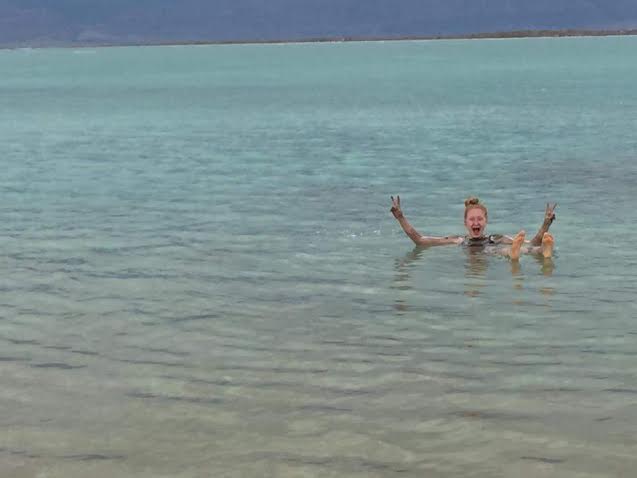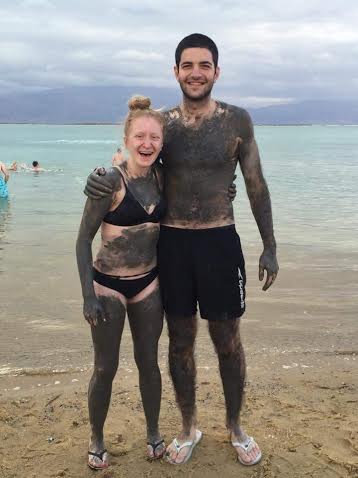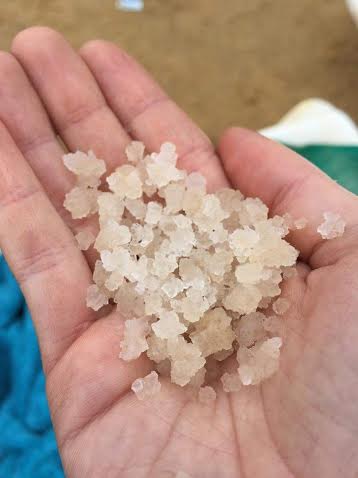Loving The Dead Sea
On the first day of 2016, I found myself waking up to the sound of thunder in the desert. The earliest hours of the day were crackling with lighting. I opened my eyes to the shudder of wind striking the tarp sides of our tent, rain pouring outside, waking up and falling asleep to the sound of a storm. We had meant to wake up at 5 am that morning, but the storm pushed our plans back to make us wait for another few hours hoping to wait out the massive storm. None of us complained about a few extra hours of rest. We were sleeping in the middle of the desert near Kfar Hanokdim, in a Bedouin camp that was hosting a large number of other Birthright groups besides my own. The camp was prepared to give outsiders a taste of traditional Bedouin culture and their ways of life, and while we were there we spend the slept in a massive tent that would have been more realistic to ancient Bedouin tribes continuously on the move. Nowadays, many Bedouin families spend their time in one place tending to their animals. I could tell the storm had a great impact on the earth around the camp, as water gushed in rivulets through the sand and clay of the ground. The rain subsided long enough for us The Bedouins prepared a fantastic impromptu breakfast for us, a flavorful and rich meal with many options catering to American tastes. There were options for Bedouin tea, coffee, and hot chocolate, and across the hall you could find salads, yogurt, fruits, and freshly cooked eggs and potatoes. It was an impressive and generous meal you could smell as soon as you entered the enormous tent which served as a dining hall, decorated in scarves and wooden carvings. After a quick update on our schedule from Maayan, our tour guide, we learned sadly that we wouldn't be able to climb Mt. Masada for sunrise as our tour had originally planned. But I thought, as we were driving away headed for the Dead Sea, the next most exciting adventure was about to start.
First, our bus ascended a long, lonely highway up the side of Mt. Masada, our bus pumping with Israeli music as we flew by red rock on one side and a wide open plain of soaked desert rocks on the other. Finally, the we saw the curvaceous image of the Dead Sea appear from behind an edge of the mountain, far below in the valley. Driving down into the area of the Dead Sea you can see marked lines on the side of the mountain walls to your right that indicate the points of -100, -200, -300 meters below sea level. The color begins to define the sea as you get closer, turning from sun-drenched silver to an aquamarine that glows bright blue as you get closer. It was cold when we arrived, still windy from the storm, but that didn't stop several of us from getting to the beach and covering ourselves in some mineral-rich mud. Wading into the water to wash off the mud, you can feel the salt begin to collect on your skin. No open cuts or wounds on me, I could feel no burn from the intense salt, but I could definitely feel the unfamiliar sting of the salt crystals coating the bottom of the sea. Where I was expecting soft sand, I could feel only strange sharp fragments of natural pale pink salt. Giving up on walking, my friends told me to just lay back! But how could you lay back, it's water! My brain kept telling me no, you'll sink! But as soon as I let go of this fear and sat back as in a chair, I could feel the weight of my body lifting from me as I rose up to float gently in the Dead Sea. It was the most amazing feeling, unlike anything else on earth. And then, when there were no waves and I could feel the mineral-rich water rinse the mud from my skin, I paddled my way a little further out and looked out, with an enormous feeling of hope and excitement for this new year. If places so amazing can exist on earth, I was sure anything can be possible for my future--and for the future of this beautiful country.



After leaving the Dead Sea, we drove to a familiar mall for lunch before driving into Jerusalem. This ancient city would be our home for the next two days for Shabbat. We arrived at our hotel which was magnificent! Everything was large and grand and full of elegance, marble floors and a bright, welcoming sound of families joining birthright groups for the lighting of candles to begin the evening. First was Kabalat Shabbat, where one of our group leaders, Ari, led a wonderful discussion about the meaning and significance of the ancient song Lecha Dodi. It was a very interesting discussion because not only did we visit the very city where the song was written, Tsefat, but we were also given the privilege of celebrating Shabbat in the holy city of Jerusalem.
Those of us who had been here before for Shabbat shared stories of moving and deeply emotional visits to the Western Wall for Shabbat. They really showed how deeply connected each of us is to one another as a large family and the significance of being in the most important city during the most special time of the week. It was truly beautiful to listen to how fully and deeply people are invested in Shabbat. It can be inspiring to see how much people care about their faith and their culture after so many ongoing trials. We discussed the meaning of the Shabbat Bride and how we each see that metaphor of Shabbat, how important rest is to all of us. We enjoyed a delicious Shabbat dinner in the hotel, and after we all worked together for clean up, we celebrated Oneg Shabbat, a Shabbat party! We took turns playing games, getting to know one another, and giving small gifts in a game similar to Secret Santa. It was a really moving event that helped us tie the two wonderful Shabbats we have celebrated here in Israel and I think served as an excellent way to begin our stay here in Jerusalem. I couldn't have been more excited and passionate about this day.
Shabbat Shalom!

